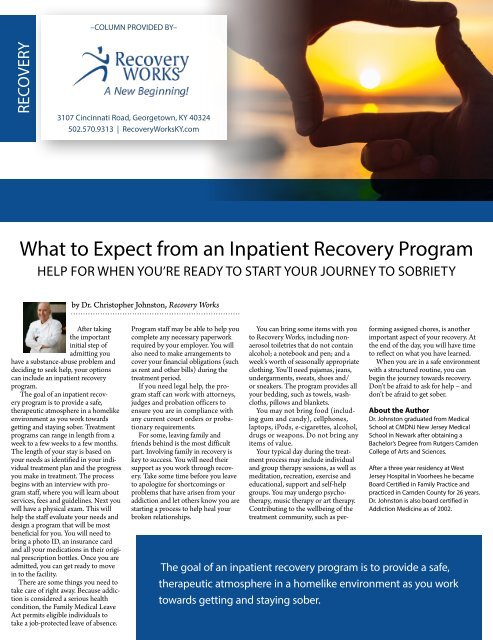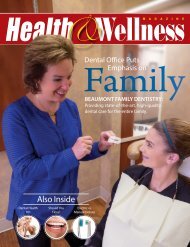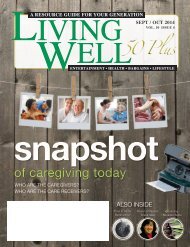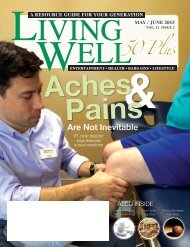Create successful ePaper yourself
Turn your PDF publications into a flip-book with our unique Google optimized e-Paper software.
–COLUMN PROVIDED BY–<br />
RECOVERY<br />
3107 Cincinnati Road, Georgetown, KY 40324<br />
502.570.9313 | RecoveryWorksKY.com<br />
What to Expect from an Inpatient Recovery Program<br />
HELP FOR WHEN YOU’RE READY TO START YOUR JOURNEY TO SOBRIETY<br />
by Dr. Christopher Johnston, Recovery Works<br />
After taking<br />
the important<br />
initial step of<br />
admitting you<br />
have a substance-abuse problem and<br />
deciding to seek help, your options<br />
can include an inpatient recovery<br />
program.<br />
The goal of an inpatient recovery<br />
program is to provide a safe,<br />
therapeutic atmosphere in a homelike<br />
environment as you work towards<br />
getting and staying sober. Treatment<br />
programs can range in length from a<br />
week to a few weeks to a few months.<br />
The length of your stay is based on<br />
your needs as identified in your individual<br />
treatment plan and the progress<br />
you make in treatment. The process<br />
begins with an interview with program<br />
staff, where you will learn about<br />
services, fees and guidelines. Next you<br />
will have a physical exam. This will<br />
help the staff evaluate your needs and<br />
design a program that will be most<br />
beneficial for you. You will need to<br />
bring a photo ID, an insurance card<br />
and all your medications in their original<br />
prescription bottles. Once you are<br />
admitted, you can get ready to move<br />
in to the facility.<br />
There are some things you need to<br />
take care of right away. Because addiction<br />
is considered a serious health<br />
condition, the Family Medical Leave<br />
Act permits eligible individuals to<br />
take a job-protected leave of absence.<br />
Program staff may be able to help you<br />
complete any necessary paperwork<br />
required by your employer. You will<br />
also need to make arrangements to<br />
cover your financial obligations (such<br />
as rent and other bills) during the<br />
treatment period.<br />
If you need legal help, the program<br />
staff can work with attorneys,<br />
judges and probation officers to<br />
ensure you are in compliance with<br />
any current court orders or probationary<br />
requirements.<br />
For some, leaving family and<br />
friends behind is the most difficult<br />
part. Involving family in recovery is<br />
key to success. You will need their<br />
support as you work through recovery.<br />
Take some time before you leave<br />
to apologize for shortcomings or<br />
problems that have arisen from your<br />
addiction and let others know you are<br />
starting a process to help heal your<br />
broken relationships.<br />
You can bring some items with you<br />
to Recovery Works, including nonaerosol<br />
toiletries that do not contain<br />
alcohol; a notebook and pen; and a<br />
week’s worth of seasonally appropriate<br />
clothing. You’ll need pajamas, jeans,<br />
undergarments, sweats, shoes and/<br />
or sneakers. The program provides all<br />
your bedding, such as towels, washcloths,<br />
pillows and blankets.<br />
You may not bring food (including<br />
gum and candy), cellphones,<br />
laptops, iPods, e-cigarettes, alcohol,<br />
drugs or weapons. Do not bring any<br />
items of value.<br />
Your typical day during the treatment<br />
process may include individual<br />
and group therapy sessions, as well as<br />
meditation, recreation, exercise and<br />
educational, support and self-help<br />
groups. You may undergo psychotherapy,<br />
music therapy or art therapy.<br />
Contributing to the wellbeing of the<br />
treatment community, such as performing<br />
assigned chores, is another<br />
important aspect of your recovery. At<br />
the end of the day, you will have time<br />
to reflect on what you have learned.<br />
When you are in a safe environment<br />
with a structured routine, you can<br />
begin the journey towards recovery.<br />
Don’t be afraid to ask for help – and<br />
don’t be afraid to get sober.<br />
About the Author<br />
Dr. Johnston graduated from Medical<br />
School at CMDNJ New Jersey Medical<br />
School in Newark after obtaining a<br />
Bachelor’s Degree from Rutgers Camden<br />
College of Arts and Sciences.<br />
After a three year residency at West<br />
Jersey Hospital in Voorhees he became<br />
Board Certified in Family Practice and<br />
practiced in Camden County for 26 years.<br />
Dr. Johnston is also board certified in<br />
Addiction Medicine as of 2002.<br />
The goal of an inpatient recovery program is to provide a safe,<br />
therapeutic atmosphere in a homelike environment as you work<br />
towards getting and staying sober.
















